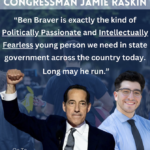[oldembed width="420" height="245" src="https://www.msnbc.msn.com/id/32545640" flashvars="launch=49223243&width=420&height=245" fid="2"]
I'm getting so tired of these conversations about "fixing" our "broken" education system by Democrats and Republicans alike that ignore one of the biggest contributing factors to how education has failed our children: the ever-widening social inequality that exists in this country.
In America, we don't have an education crisis; rather we have a poverty crisis. The latest Program for International Student Assessment (PISA) scores indicate that American schools that serve few low-income students rank higher than the world's top-scoring advanced industrial countries. But when they are averaged with the scores of schools with high poverty rates, the United States sinks to the middle of the pack. At nearly 22 percent and rising, the child-poverty rate in the United States is the highest among wealthy nations in the world. (Poverty rates in Denmark and in Finland, top global performers on the PISA exams, are below 5 percent). In New York City, the child-poverty rate rose to over 30 percent in 2010. Like other aspects of the inequitable U.S. distribution of wealth, our child poverty crisis seems to fall within a national blind spot.
Childhood poverty has a profound impact on learning. Achievement gaps for disadvantaged children begin before they start school and widen throughout their school careers.
No demonizing of teachers' unions (looking at you, Michelle Rhee) or touting of charter schools (especially for personal profit) will improve the state of education for those who need it the most, because we ignore that these children live lives of instability, hunger, violence and poverty. How realistic is it to expect that with just the right combination of demoralized teachers, standardized testing and parent triggers these children can rise above all those obstacles? Instead of treating teachers like antagonists in this scenario, how much more could we achieve towards improving education by treating teachers as allies?
if you want to improve teaching, you probably won’t succeed by disbanding their unions or getting them to work longer hours for the same pay. A more likely strategy--employed by America’s overseas competitors--is to raise the wages and status of elementary and secondary teachers. Although there are many excellent teachers now, that would probably attract better-educated and more committed teachers who would be willing to brave the enormous difficulties of teaching kids who have a bleak view of their own future. An OECD report sums up the situation of American teachers:
Teachers in the U.S. earn substantially less than their peers with similar educational backgrounds. Salary scales are typically also less steep than in other countries. A high school teacher in the U.S. with 15 years of experience can expect to receive only 65 percent of the earnings of a tertiary-educated individual working in another profession, a proportion substantially below that observed in other OECD countries (85 percent). The relatively low wages for teachers in primary, secondary, and upper secondary education compared with the earnings of people with similar educational backgrounds in other occupations suggests that salaries alone may not attract the most talented students to the education profession in the U.S.
Right now, the education reform movement wants teachers to behave like doctors or lawyers without enjoying anything like their income, status, or authority. In the documentary, Waiting for Superman, an anthem to the education reform movement, the narrator declares that “in Illinois, one in 57 doctors loses his or her medical license, and one in 97 attorneys loses his or her law license, but only one teacher in 2,500 has ever lost his or her credentials.” These statistics are often cited to argue that teachers don’t deserve tenure or union protection. The statistics, as it turns out, are unconfirmable, but even if they were accurate, they are still based on a false premise that what should apply to physicians and lawyers should apply to school teachers. Perhaps in Europe, but not in the United States.
School reform? It was an important movement in the nineteenth and early twentieth century. John Dewey certainly did understand that educational reform had to be coupled with economic and social reform. Dewey was also a member of the American Federation of Teachers. But with some exceptions, today’s version of education reform, led by StudentsFirst or Stand for Children or All Children Matter, much more resembles one of those political fads--I think of technocracy during the 1920s--that periodically energize rich people and politicians who are unwilling to contemplate the obvious kinds of changes that the society needs – changes that might threaten their wealth and power -- and fixate instead on utopian visions and dystopian demons. These dreamers are, to paraphrase a former president, much more part of the problem than the solution.

















